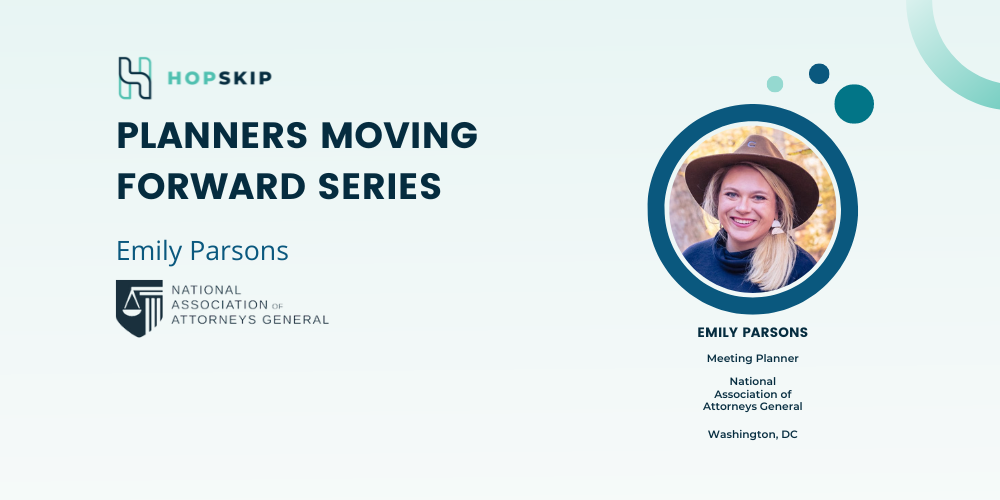This post is part of the HopSkip Planner Spotlight Series where HopSkip spotlight's planners across the industry to bring awareness of how they adapted to COVID-19, communicating and lessons learned and sharing how they are viewing the meetings and events industry in a post-pandemic world.
Name: Emily Parsons
Company Name: National Association of Attorneys General
Job Title: Meeting Planner
Years of Experience: 3
How do you think you are positioned, after months of persevering with the pandemic, to take advantage of our new and disrupted meetings/events landscape?
Honestly, I believe that I came out of this crazy time a better professional. I never in a million years thought that I would have become so proficient in technology and AV. This time has taught me to take chances on new ideas because until you try something you don't know if it will work. The last two years have been hard, but coming back to in-person events, I have a renewed energy for what this industry and community are capable of accomplishing when we come together. I look forward to showing future generations of event professionals how resilient and rewarding this industry is!
As our community moves forward with planning in-person meetings, what new technologies or processes are you implementing that you may have not looked at before?
For a while, we did hybrid, like everyone else in the events industry, but we have since really stopped just because our members wanted to be in person. I don't think there will really ever be anything that will take place of face-to-face interaction. I do think that people see travel a bit differently than they did before. After spending so long at home, I do think that it takes more to get people willing to leave home and miss out on things in their personal lives to come to a conference. On the flipside, this is putting more on the event professional to make sure the program will be worthwhile and memorable because in the end, we are all memory makers!
As we see virtual meetings transition back to face to face, hybrid meetings are beginning to be the vehicle to return to normalcy. What are your thoughts on hybrid meetings versus traditional fully in-person meetings?
Of course hybrid meetings allow for more flexibility on the attendees that are coming. I do believe that there is disparity between the cost of putting on a hybrid event and the ROI. I think the cost of hybrid alone is one of the biggest driving factors for the push to be back completely in-person. Unfortunately, there is no economical way to do a hybrid meeting and I feel like the AV/tech/platform companies really the pandemic to leverage making more money since there was no way around it.
In your opinion, what do you think the biggest value for your attendees is in regards to returning to live events?
Networking, for sure! Our attendees are either government lawyers, private practice attorneys, or lobbyists and we are able to give them a space where they can come together outside of the typical work setting and truly network. We attempted virtual networking a couple of times and to be honest it is completely awkward and doesn't provide those spontaneous moments.
As the pandemic fades away and we return to face-to-face events what do you hope changes, either for planners or hoteliers, in the traditional RFP and proposal process as a result of all of the learnings from the last 20+ months?
I hope to see a bit more flexibility, especially when it comes to attrition rates, cancellation/rebooking clauses, and F&B minimums. Most organizations want to be at a place they were pre-pandemic where they are contracting out further in advance, but unfortunately with things still up in the air and strict clauses making it difficult to get out or postpone it is making it hard to be able to contract in advance.
This post is part of the HopSkip Planner Spotlight Series where HopSkip spotlight's planners across the industry to bring awareness of how they adapted to COVID-19, communicating and lessons learned and sharing how they are viewing the meetings and events industry in a post-pandemic world.
